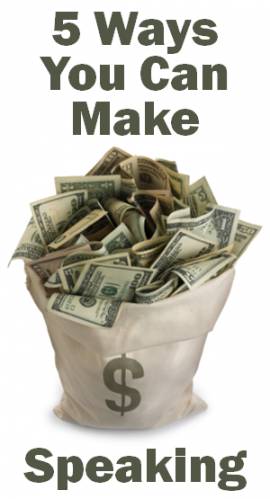| Home » Articles » Speaking habits |
For example, a recent question from Tanya M. asks:
In this article, we examine 5 common ways that speakers make money. The good news is that Tanya — and you — can tap into any of them.
1. Keynote SpeechesIf you have ever dreamed of being a professional speaker rolling in money, you probably imagined yourself delivering keynote speeches to crowds of thousands. Is this where the big money is? Well, if you measure by earnings per minute spoken, yes! Keynote speakers commonly earn between $10,000 and $100,000 for a 1-hour lecture. The world’s most desired speakers command fees even beyond that. Even if you earn a modest $5,000 per keynote, you only need 20 bookings per year for a six-figure salary. Sounds good, doesn’t it? But… there’s a catch. Most of the people earning these fees are celebrities in one form or another:
Expensive keynote fees are (usually) supported by expensive event tickets. To sell these expensive tickets, event organizers must have a famous person to market. Who’s going to sell more $1000 tickets — Bill Clinton or Bill Unknown? Duration: 1 hour (typically) Compensation: high to very, very high Key to Success: Get busy and become famous. Work harder than anyone and earn valuable experience which you can then dispense to the highest bidder. 2. SeminarsSeminar speeches are quite similar to keynote speeches:
What’s the difference then? The primary difference is compensation, with keynote speakers generally compensated at a much higher rate. Events vary widely, but it is not uncommon for keynote speakers to be highly compensated while seminar speakers are either unpaid or minimally compensated. Variation in compensation leads to several other differences:
But it’s not all bad for seminar speakers. Though some events do not compensate seminar speakers, others do at very attractive rates. Further, seminar slots provide wonderful exposure for speakers. This exposure can be translated into future (paid) speaking opportunities or other money-making activities. Duration: 1 hour (typically) Compensation: zero to moderate Key to Success: Do your research, and find the events or organizations which offer the best mix of compensation and exposure. 3. TrainingWhile keynote speakers command the highest earnings per minute, it’s likely that training professionals collectively earn the largest fraction of the speaking industry’s dollars. Why? Two reasons:
[Note: For the purposes of this article, I’m focusing here on training that occurs outside of formal (school and university) classrooms.] Training programs throughout the world are necessary to supplement the skills of professionals. Every forward-looking business seeks to make their employees more effective, and thus devote significant dollars to training, both internally and externally. While keynote speakers are often hired for their celebrity, trainers are hired for the impact they can have on a company’s bottom line. If you have knowledge and experience to increase sales, productivity, or other key business metrics, then training might be for you. Duration: several hours to several days Compensation: moderate to high Key to Success: Develop the expertise that businesses need, and then focus your marketing efforts on the value you can provide to individuals or businesses. 4. Product SalesBut you don’t need a huge speaking fee to walk away from an event with lucrative profits. You can even make money when speaking for free! How? Product sales. Sales of companion products are one way to turn just about any speaking opportunity into money.
What kind of products? Books and audio/video recordings are the most common, but it could be anything, including less tangible products like memberships. Profit margins will be highest for products you created yourself, but it is also common to sell products created by others. Obviously, the product should be closely related to the presentation being delivered. The profit from selling one item to one person is pretty minimal, but if you can find ways to multiply that by large numbers of items or large numbers of people, profits can become significant. Duration: n/a (product development takes time, but it isn’t in front of an audience) Compensation: minimal to high Key to Success: Package your hard-earned knowledge in a way that audiences can take home with them, and position the products as an extension of your in-person presentation. 5. Speech coaching & speech writingSpeech coaches and speech writers are somewhat alike:
What is the difference? The expertise they offer. Speech writers write wonderfully crafted speeches, targeted for specific audiences and specific purposes, and written in the “voice” of the speaker. Speech coaches, on the other hand, tend to focus on helping speakers hone their delivery skills. [Of course, there are people who fill both roles.] Compensation: low to high Key to Success: Become a master of audience analysis and all the “little things” that make speeches and speakers more effective. Then, figure out how to transfer this knowledge to speakers who can afford your services. Are you Making Money Speaking?How about you? Are you deriving all or part of your income from speaking? If not, would you like to? What’s holding you back? | |
| Views: 402 | |
| Total comments: 0 | |
